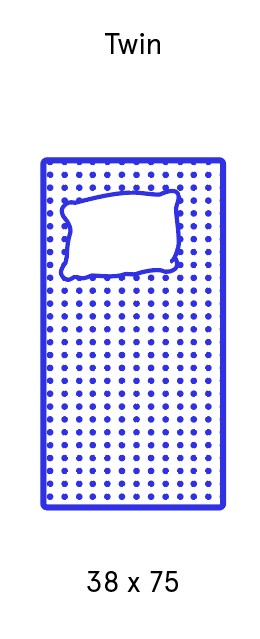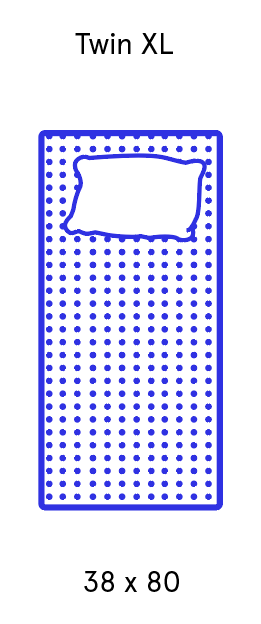Will a Twin Sheet Fit a Twin Xl Mattress
Our editors test & choose the products we write about. When you buy through links on our site, we may earn a commission. Learn More.
Twin Mattress vs. Twin XL Mattress
Key Differences and Similarities Between Twin and Twin XL Sizes
Although they are fairly similar, Twin and Twin XL sizes differ slightly in several ways. The table below highlights some of these distinctions, as well as similarities between the two sizes.
Pros and Cons of a Twin Size
 A Twin is the smallest standard mattress size available, measuring thirty-eight inches (38″) wide by seventy-five inches (75″) long. This size is commonly found in college dorms, as well as hospitals, nursing homes, and other healthcare facilities with overnight accommodations.
A Twin is the smallest standard mattress size available, measuring thirty-eight inches (38″) wide by seventy-five inches (75″) long. This size is commonly found in college dorms, as well as hospitals, nursing homes, and other healthcare facilities with overnight accommodations.
Benefits of the Twin mattress include the following:
- Less space required: A Twin is five inches shorter than a Twin XL, making it suitable for bedrooms that are slightly shorter.
- Lower price-point: The average cost of a Twin mattress is $300 to $600, making them roughly $100 to $200 cheaper than Twin XL models. In some cases, Twin and Twin XL mattress models share the same price-point.
- Wide availability: Most mattress models sold today are available in a Twin-size option, although this may not be offered for models that are thicker than average.
- Lightweight: Due to its relatively small size, a Twin-size mattress can usually be moved without assistance.
- Kid-friendly: A Twin-size mattress will fit into most standard bunk beds, and may also be suitable for young children using standalone beds.
Some drawbacks of a Twin mattress include the following:
- Too narrow and short for some: A Twin-size mattress does not offer much extra room as far as width goes, and it is five inches shorter than a Twin XL. Sleepers should only consider this mattress is extra sleeping space is not a top priority.
- Not couple-friendly: A Twin-size mattress will not be suitable for most couples due to relatively narrow sleep space.
Pros and Cons of a Twin XL Size
 A Twin Extra Long, or Twin XL, measures eighty inches (80″) long, which is five inches (5″) longer than a standard Twin; both a Twin and Twin XL measure roughly thirty-eight inches (38″) wide. For reference, a Twin XL is roughly equivalent to one-half of a standard King-size mattress (76W" x 80L").
A Twin Extra Long, or Twin XL, measures eighty inches (80″) long, which is five inches (5″) longer than a standard Twin; both a Twin and Twin XL measure roughly thirty-eight inches (38″) wide. For reference, a Twin XL is roughly equivalent to one-half of a standard King-size mattress (76W" x 80L").
Benefits of a Twin XL mattress include the following:
- Extra length: A Twin XL can accommodate anyone who stands under 6'8″, including those between 6'3″ and 6'7″ that are too tall for a standard Twin-size mattress.
- Lightweight: Though they often weigh more than a Twin, Twin XL mattresses are still fairly light and easy to move without assistance for most people.
- Kid-friendly: A Twin XL mattress is suitable for many children who use standalone bed frames, and may also fit into select bunk beds.
Drawbacks of Twin XL mattresses include the following:
- Takes up more space: A Twin XL may not fit in shorter bedrooms that are large enough to accommodate a standard Twin.
- Higher price-point: Although the difference in price is rarely significant, a Twin XL mattress will normally cost at least $50 more than a Twin – though in some instances, both sizes will be priced the same.
- Too narrow for some: While a Twin XL offers more length than a standard Twin, both sizes have the same width — thirty-eight inches (38″) — which may not be adequate for sleepers that like extra space.
- Not couple-friendly: Like the Twin, a Twin XL will be too narrow for most couples to sleep comfortably, and is typically suitable for single sleepers only.
Is a Twin or Twin XL Size Right for You?
While there may not seem like much of a difference, those extra five inches (5") of length on a Twin XL mattress can make huge difference for a tall adult. Both Twin and Twin XLs are 38" wide, so their only difference is the extra length. Consider the following factors when deciding between a Twin or a Twin XL.
Do you sleep alone or with a partner?
Due to their narrow size, both the Twin and Twin XL sizes are best suited for single people who are sleeping alone. Everybody needs sufficient space to curl up into their preferred sleeping position each night, so if you plan on sharing your bed with another adult you should consider moving up to a Full/Double size mattress instead. Otherwise, a Twin model is a tight fit for more than one person.
What is your body type?
Your body type can inform which mattress size is best for you. Since both the Twin and the Twin XL are the same width, your height will make the difference here. Shorter people likely will not miss the extra five inches (5") that a Twin XL provides. As you begin to approach six feet, however, a Twin XL becomes an absolute necessity. When shopping for child or teenager, keep in mind that they may outgrow a standard Twin mattress.
Do children and/or pets frequently share your bed?
Even when not shared with another adult, many people have pets or young children who hop into their bed. If you tend to snuggle up with your furry friends, a Twin XL mattress will give you just enough extra length to keep a small pet at the end. Though it may be feasible for some, we generally wouldn't recommend a Twin or Twin XL mattress for people sleeping with anybody other than themselves. Thus, neither option is ideal if your children like to sleep in your bed.
How do you position your body when you sleep?
Whether you sleep on your back, side, or stomach could determine which mattress size is best for you. If you tend to move around a lot or stretch your legs out, a Twin XL will provide more length for you to do so. This is especially important for back sleepers who often sleep in a narrow and lengthened position. If you like to curl up into the fetal position or sleep on your side, a Twin mattress will feel exactly the same as a Twin XL. You might want to visit a mattress store and try out both the Twin and Twin XL mattress to see which one feels best.
How much bedroom space do you have?
You can't get smaller than a Twin-size bed, and even the Twin XL mattress is only five inches (5") longer. Both mattresses should fit fine into any standard size bedroom. If you need to make room for additional sleepers, many bedrooms are large enough to fit two Twin or Twin XL mattresses.
What is your mattress shopping budget?
Twin and Twin XL mattresses are the cheapest of all the mattress sizes, with the latter usually around $100 more than the former. Consequently, both of these models are a great option single sleepers who are trying to spend as little money as possible. If you can't afford one of these sizes, we recommend that you wait for a mattress sales event or check out our Best Mattresses for the Money page.
Conclusion
Because Twin and Twin XL mattresses have similar dimensions and tend to have comparable price-points, the decision to choose one over the other often comes down to length. A Twin XL will comfortably accommodate anyone who stands at 6'7″ or shorter, while a Twin will be suitable for anyone who stands 6'2″ or shorter.
A Twin-size mattress may be the better option for children who sleep in bunk beds that are too short to accommodate Twin XL mattresses, but if the child is not using a bunk bed then either size will usually suffice. It's important to note that neither the Twin nor the Twin XL will accommodate most couples, nor do they provide extra width space for single sleepers.
This guide draws on things that we have generally found to be true. That being said, mattress size preference is ultimately subjective. If you can't decide which size is right, we suggest testing out Twin and Twin XL mattresses in brick-and-mortar stores to see which length feels best. You can also sleep on both sizes for a prolonged period of time by selecting brands and models with sleep trials. Simply return the mattress that is less satisfactory before the trial period ends in order to receive a full refund.
Additional Resources
Will a Twin Sheet Fit a Twin Xl Mattress
Source: https://www.tuck.com/mattress-sizes/twin-vs-twin-xl/
0 Response to "Will a Twin Sheet Fit a Twin Xl Mattress"
Post a Comment